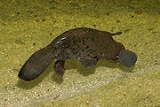
Platypus
Overview
The platypus is a semi-aquatic mammal
endemic
to eastern Australia
, including Tasmania
. Together with the four species of echidna
, it is one of the five extant species of monotreme
s, the only mammals that lay eggs
instead of giving birth to live young. It is the sole living representative of its family
(Ornithorhynchidae
) and genus
(Ornithorhynchus), though a number of related species have been found in the fossil record.
The bizarre appearance of this egg-laying, venom
ous, duck
-billed, beaver
-tailed, otter
-footed mammal baffled European naturalists when they first encountered it, with some considering it an elaborate fraud.
Mammal
Mammals are members of a class of air-breathing vertebrate animals characterised by the possession of endothermy, hair, three middle ear bones, and mammary glands functional in mothers with young...
endemic
Endemic (ecology)
Endemism is the ecological state of being unique to a defined geographic location, such as an island, nation or other defined zone, or habitat type; organisms that are indigenous to a place are not endemic to it if they are also found elsewhere. For example, all species of lemur are endemic to the...
to eastern Australia
Eastern states of Australia
In Australia, the term eastern states refers to the states adjoining the east coast of Australia. These are the mainland states of New South Wales, Queensland and Victoria. The Australian Capital Territory and Jervis Bay Territory, while not states, are also included. The term usually includes the...
, including Tasmania
Tasmania
Tasmania is an Australian island and state. It is south of the continent, separated by Bass Strait. The state includes the island of Tasmania—the 26th largest island in the world—and the surrounding islands. The state has a population of 507,626 , of whom almost half reside in the greater Hobart...
. Together with the four species of echidna
Echidna
Echidnas , also known as spiny anteaters, belong to the family Tachyglossidae in the monotreme order of egg-laying mammals. There are four extant species, which, together with the platypus, are the only surviving members of that order and are the only extant mammals that lay eggs...
, it is one of the five extant species of monotreme
Monotreme
Monotremes are mammals that lay eggs instead of giving birth to live young like marsupials and placental mammals...
s, the only mammals that lay eggs
Egg (biology)
An egg is an organic vessel in which an embryo first begins to develop. In most birds, reptiles, insects, molluscs, fish, and monotremes, an egg is the zygote, resulting from fertilization of the ovum, which is expelled from the body and permitted to develop outside the body until the developing...
instead of giving birth to live young. It is the sole living representative of its family
Family (biology)
In biological classification, family is* a taxonomic rank. Other well-known ranks are life, domain, kingdom, phylum, class, order, genus, and species, with family fitting between order and genus. As for the other well-known ranks, there is the option of an immediately lower rank, indicated by the...
(Ornithorhynchidae
Ornithorhynchidae
Ornithorhynchidae is one of the two extant families in the order Monotremata, and contains the Platypus and its extinct relatives. The other family is the Tachyglossidae, or echidnas...
) and genus
Genus
In biology, a genus is a low-level taxonomic rank used in the biological classification of living and fossil organisms, which is an example of definition by genus and differentia...
(Ornithorhynchus), though a number of related species have been found in the fossil record.
The bizarre appearance of this egg-laying, venom
Venom
Venom is the general term referring to any variety of toxins used by certain types of animals that inject it into their victims by the means of a bite or a sting...
ous, duck
Duck
Duck is the common name for a large number of species in the Anatidae family of birds, which also includes swans and geese. The ducks are divided among several subfamilies in the Anatidae family; they do not represent a monophyletic group but a form taxon, since swans and geese are not considered...
-billed, beaver
Beaver
The beaver is a primarily nocturnal, large, semi-aquatic rodent. Castor includes two extant species, North American Beaver and Eurasian Beaver . Beavers are known for building dams, canals, and lodges . They are the second-largest rodent in the world...
-tailed, otter
Otter
The Otters are twelve species of semi-aquatic mammals which feed on fish and shellfish, and also other invertebrates, amphibians, birds and small mammals....
-footed mammal baffled European naturalists when they first encountered it, with some considering it an elaborate fraud.

